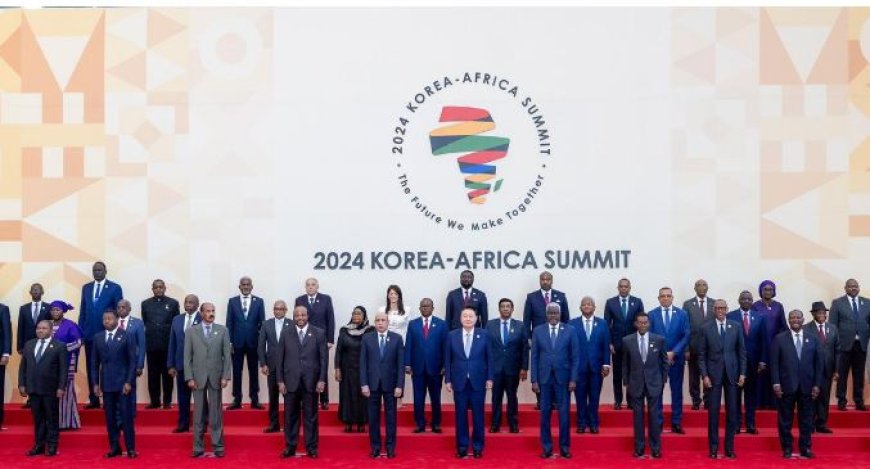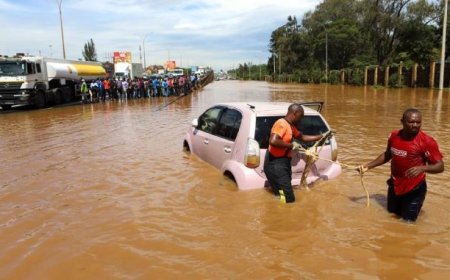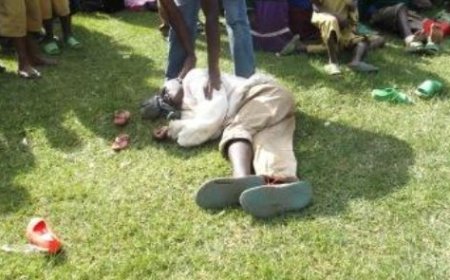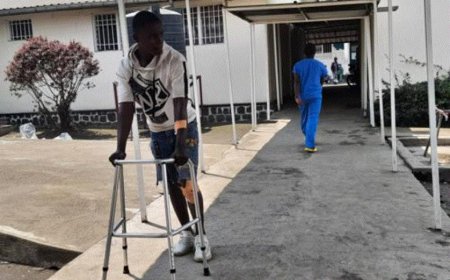Why South Korea wants Africa's piece
South Korea is counting on its first summit with African leaders on Tuesday to raise its profile on the continent and strengthen economic ties, officials said ahead of the meeting in Seoul.

But in an Africa where China, the United States, Russia, the European Union, Britain and India have already presented their ideas, the South Koreans say the two-day event should also be a reflection of shared experiences and lessons learned.
Chung Byung-won, Korea's vice minister of political affairs at the Foreign Ministry, told a group of journalists that his country was best placed to work with Africa because of its shared history of poverty.
“Among the countries that have already held a summit with Africa, no country has a history comparable to that of Korea and Africa. Korea overcame these obstacles and achieved remarkable growth not only alone but with the support of the international community,” Chung said from Seoul before the summit.
But it is not an emotional attachment. South Korea is racing to exploit Africa's vast mineral resources, which could fuel the country's transition to greener technologies. It is also rushing to consolidate its commercial links with Africa. Chung spoke in general terms, saying his country wants to strengthen economic cooperation with Africa for development and growth.
“The Republic of Korea's development expertise coupled with its steadfast commitment to aid and advanced technologies, positions it to catalyze Africa's economic growth and sustainable development. Meanwhile, Africa's booming market and ambitious development programs provide the Republic of Korea with prospects for growth and diversification of its supply chain," Chung said, referring to Korea's official name from the South.
He then turned to Ghana, and more particularly Zambia, to discuss the mining potential of these countries.
“Given that Korea is a leader in electric vehicle production and enjoys strong competitiveness in advanced industrial sectors such as secondary batteries, the potential for cooperation with Zambia, rich in essential minerals like copper, is huge.
The summit, he said, constitutes "the best opportunity for Korea to support Africa's proactive development path based on its own experience and expertise."
Some 25 African leaders have confirmed their presence, according to a preliminary message sent to journalists, although Seoul said it had received confirmation of the presence of representatives from 48 African countries. South Korea also has 25 embassies on the mainland, a relationship that has grown over the past 30 years.
Leaders in Seoul include President William Ruto of Kenya, Samia Suluhu Hassan of Tanzania and Paul Kagame of Rwanda. South Korea granted state visits to President Samia, Ethiopian Prime Minister Abiy Ahmed and Sierra Leonean President Julius Maada Bio. Tanzania, Kenya and Morocco are among the first to begin negotiations on economic partnership agreements with South Korea, while Tanzania has already secured a $1 billion loan from the Korea Development Cooperation Fund economic development (ECDF).
The meeting will take the form of bilateral and plenary sessions, as well as meetings with business leaders, allowing African leaders to directly present their investment environments.
But South Korea presented the entire meeting as being built on three pillars: enabling the Asian country to engage more with the South, building "win-win" economic cooperation and helping address common global challenges. . . like climate change, peace and security.
As the final summit in the series, Seoul embraced both a historical narrative of surviving colonialism and poverty and a Western-centric vision of freedom, democracy and free markets.
Some brochures shared with the media show that Seoul plans to "engage in various development initiatives in Africa", including providing official development assistance (ODA), capacity-building programs and "sharing best practices in areas such as education, health care and agriculture.” He promises to maintain his “positive reputation” in Africa and help fight stereotypes about poverty, illness and backwardness.
“These initiatives aim to help African countries achieve their development goals and narrow the development gap. »
"Africa is a key partner for Korea in realizing its foreign policy aspiration of becoming a 'global pivot state,'" Cho Tae-yul, South Korea's foreign minister, said in a statement welcome statement.
In return, according to Cho, Africa “has abundant reserves of minerals essential to the fourth industrial revolution”. Africa, he said, would provide a market for trade and direct investment in areas such as infrastructure, natural resources and environment, human capital, tourism destinations and cooperation in research and development.
Arriving at a good deal in Seoul will depend on various factors. David Monday, a political science professor at the City University of New York, says it's good that Seoul is at least interested in addressing concerns about trade barriers.
"Time will tell. South Korea is trying to catch up with its Asian rivals China, Japan, Russia and India in Africa. Much will depend on the removal of tariff and non-tariff barriers to trade between Africa and South Korea,” Professor Monda declared to the Nation.
“In addition, human-to-human connections and networks will need to be developed through direct flights from Seoul to African capitals. Currently, Korean Air only serves Nairobi (suspended), Cairo and Johannesburg. In addition to this, trade between Africa and South Korea should be win-win, even if the relationship is asymmetrical,” he argued.
South Korea is considered one of the Asian countries with the strictest non-tariff barriers and historians associate it with its history of state-backed promotion of an export-oriented economy that could require reforms to adapt to African products.
“In addition, normative requirements, state trading operations and import bans are areas that will need to be negotiated. It will be interesting to see if the chair of the African Union (Mauritanian President Mohamed Ould Ghazounami) has a common African agenda related to trade with South Korea.
For some, however, the entire relationship should not be based on raw materials extracted from Africa, but African leaders should advocate value addition.
“The best solution is to push for a collective free trade agreement (FTA) in Africa. The Republic of Korea does not have a Free Trade Agreement (FTA) with Africa, making African agricultural products uncompetitive,” observed Mr. Ngovi Kitau, former Kenyan Ambassador to South Korea.
“Keep in mind that Korea's population is similar to Kenya's at 50 million. This limits the demand for consumables.
South Korea, however, says it has made good progress. The country is an observer state to the African Union and trade with Africa has increased 23-fold, from $890 million in 1988 to $20.5 billion in 2022, according to the Korea Trade Association International ( This however favours Seoul In Kenya, they only exported 6 billion shillings of goods but bought ten times more from South Korea, for example in 2022). This amount represents almost a tenth of China's trade volume.
But during this period, Seoul says its investments in Africa have increased from $63 million in 1988 to $700 in 2019. It has sent $6 billion in direct financial support to Africa in the form of loans or subsidies. He is currently part of Angola's $1 billion Lobito Corridor and claims to have spent $8 million in education support. It has also welcomed 57,000 African tourists and thousands more through sponsored training.
Lately, Koreans also say they are playing alongside Africa to help improve rice production. They are testing K-Rice production in Kenya, Uganda, Senegal and Cameroon, seeking to introduce a new type of rice capable of producing more. This is a “positive trajectory” that they believe should continue.
 Kinyarwanda
Kinyarwanda
 English
English





























